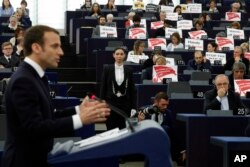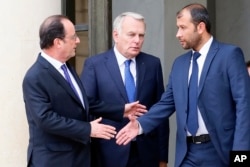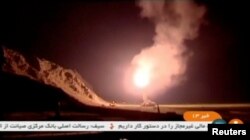After coming together in striking suspected chemical weapons sites in Syria, the U.S. and its European allies, France and Britain, may be far less unified in finding longer-term solutions for the conflict-torn country.
The first differences were on display hours after the strikes, as the White House appeared to rebut suggestions by French President Emmanuel Macron that he had convinced his U.S. counterpart to remain in Syria and agree to limited military action.
Then came Macron's own remessaging. The two countries were in line, he told reporters Monday, on how they viewed both their military and peace-building engagements.
Still, the Syria strategy, as outlined by Macron in recent days, seems far from being in lockstep with Washington. In particular, it demands engaging key Trump administration nemesis Iran, among other regional actors, to help resolve the tangled conflict. And while the French president aims to position himself as Washington's go-to leader in Europe, in matters ranging from climate change to trade, experts question whether he can deliver tangible results.
Those questions will be front and center next week when Macron and U.S. President Donald Trump hold talks in Washington.
"Macron is going, saying, 'First, please stop saying you want to leave [Syria], because this is sending exactly the wrong signal,' " said Manuel Lafont Rapnouil, head of the European Council on Foreign Relations' Paris office. "It's like giving a free pass to [Syrian leader Bashar al-]Assad and the Iranians."
Defending French strikes
On Tuesday, Macron again defended France's participation in the Syria strikes, which were carried out after an alleged chemical weapons attack by the Syrian government against the former rebel enclave of Douma.
The joint strikes were vital to uphold the "honor of the international community," Macron told the European Parliament in his first address to the body as president.
"Those who each time react indignantly before images we have all seen — of children and women killed in [the] chlorine attack — should we remain sitting on our hands?" Macron asked.
At home, the French leader faces little serious blowback for joining the strikes, although several opposition leaders have sharply criticized the move.
"He's engaged France on the road of submission [to the United States]. He's forgotten our country's independence and role in the world," said far-right National Front leader Marine Le Pen, who lost to Macron during last year's presidential runoff.
Yet, Macron's centrist La Republique en Marche Party dominates the French parliament, where lawmakers this week were limited to merely debating the strikes. And for the moment, at least, public opinion seems to be on his side, analysts said.
The move also cements Macron's determination to be seen as a man of action — in contrast to his Socialist predecessor, Francois Hollande, left dangling after the Obama administration ultimately chose not to riposte, following an earlier suspected chemical attack by the Syrian regime.
"Rather than following Washington, France has largely played the role of leader in Syria," the Le Monde newspaper wrote in an editorial, which also credited Hollande's policies.
A tougher road forward
But the way forward may not be so easy. Macron has outlined a blueprint to resolve the Syrian crisis that includes reaching out to key stakeholders in the multifaceted conflict — including Russia, Turkey and Iran. Lafont Rapnouil said Britain appears to fall roughly in line with France in calling for a political solution.
While Macron is looking longer term, Washington, by contrast, has been eyeing the exit door. Days before launching the strikes, Trump announced the U.S. would be "coming out of Syria very soon," where it has 2,000 troops.
The differences are not just military ones. Even as the U.S. recently froze recovery aid to Syria, Macron announced Monday nearly $62 million in humanitarian assistance to the country.
Still, Noah Bonsey, senior Syria analyst with the International Crisis Group, an NGO that promotes peaceful soutions to conflicts, believes finding specific areas where U.S. and European strategies on Syria clash is proving difficult. The reason is simple, he said: "The U.S. policy is totally unclear right now."
Still, there is no indication Washington is swayed by Macron's strategy of engagement. Even as the French leader slammed Moscow for being "complicit" in the alleged chemical weapons attack, he was on the phone with Russian President Vladimir Putin hours before the attack, and with Turkish President Recep Tayyip Erdogan hours after.
A planned visit to Moscow next month will also go ahead. "We speak with everyone, because that's the condition to build peace," Macron said.
His idea of including Iran in any Syria discussions — even as the Trump administration is poised to withdraw from the nuclear deal with Tehran — may prove among the sharpest areas of transatlantic differences.
"The U.S. has shown absolutely no inclination to engage Iran directly on Syria," Lafont Rapnouil said. "It's hard to see that changing anytime soon."
Making a difference?
Perhaps the bigger question is whether Macron can move beyond rhetoric. Analysts doubt France, alone, can make much difference. European Union members are divided over the joint strikes, and an EU meeting of foreign ministers Monday produced only a bland statement that the EU "understands" the joint military action — and stronger rhetoric for an urgent return to peace talks.
"It's striking how little Macron has tried to reach out to other European partners on Middle East issues," Lafont Rapnouil said.
Moving forward, he added, "it will be important for Macron to rally the Europeans around more. You can see not everyone is totally convinced."
Even so, it's unclear whether a stronger EU stance on Syria would make much difference.
"The Europeans are not in a position to replace the U.S. military role in northern and eastern Syria," the Crisis Group's Bonsey said, even if they may help to coax Washington out of a precipitous departure.
Yet the biggest roadblock to Macron's Syria strategy may lie not in Washington, but in Damascus.
"The ingredients just aren't there for a national political process that would really lead somewhere," Bonsey said. "The Syrian regime is gaining militarily. It has little interest in negotiating at the national level. So there isn't a pathway right now for a sustainable political solution in Syria."







